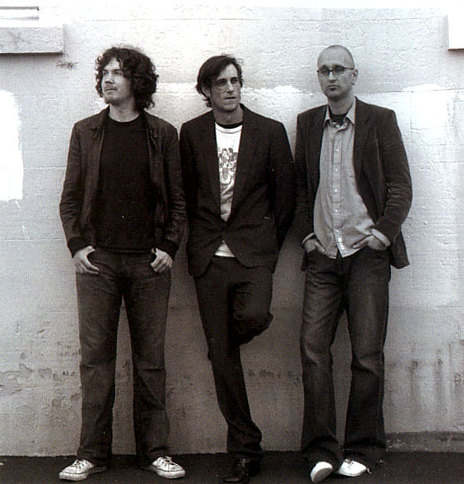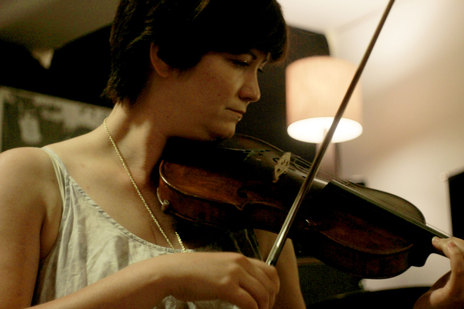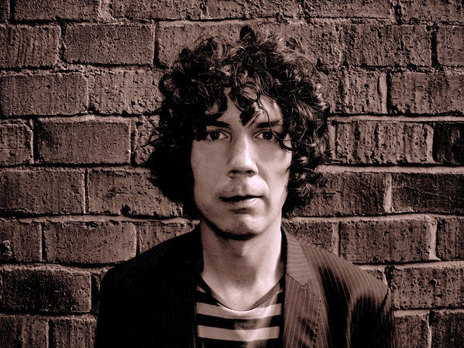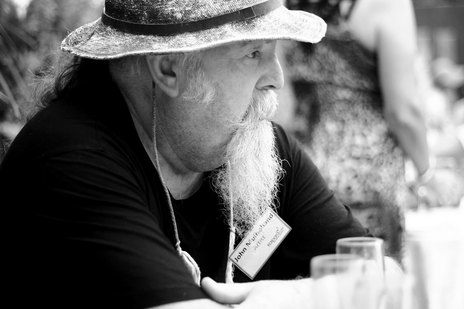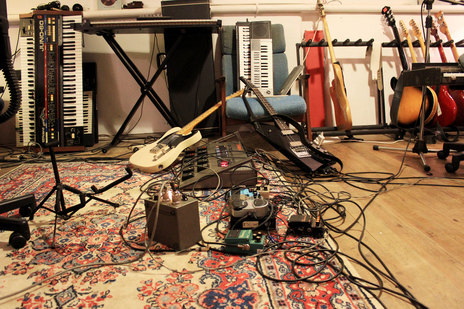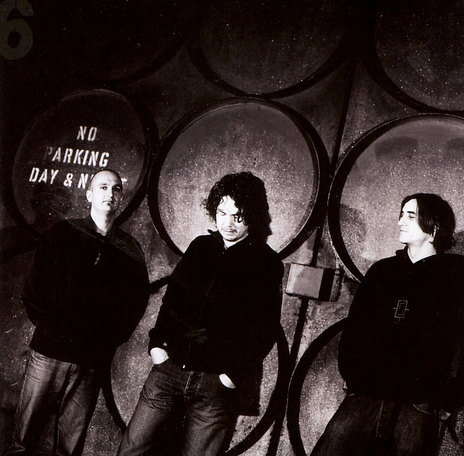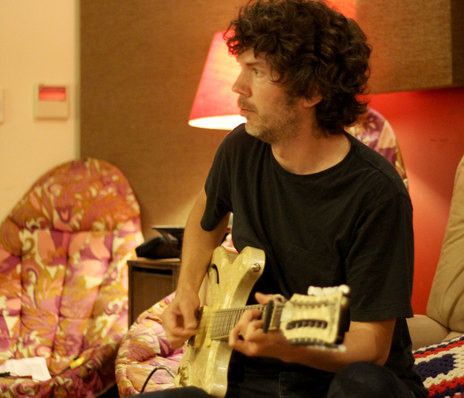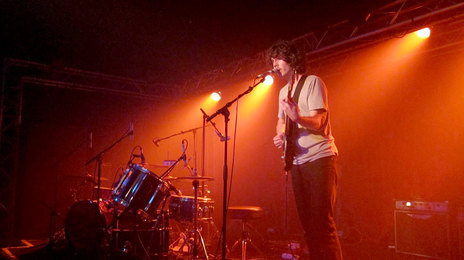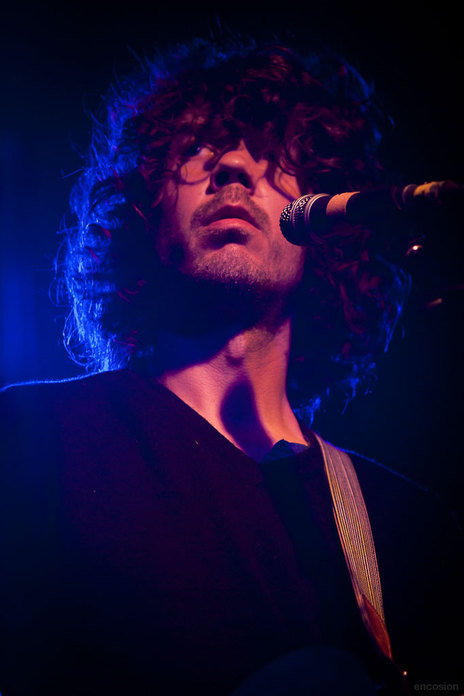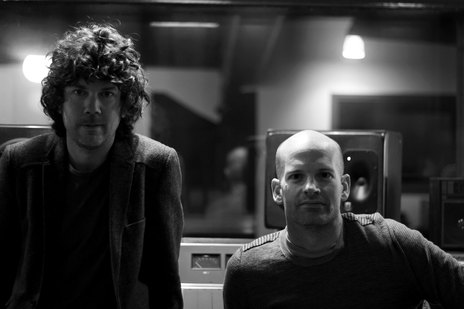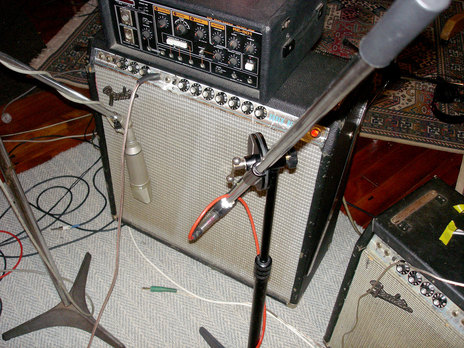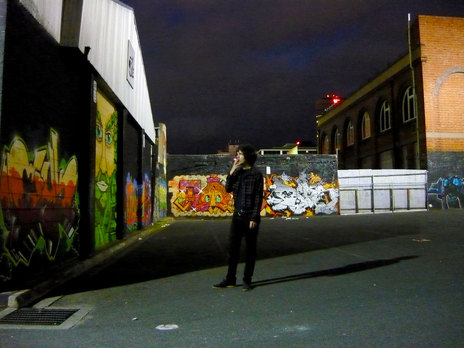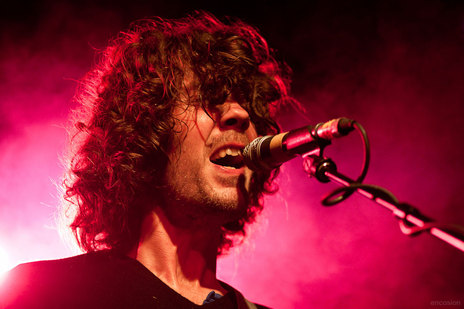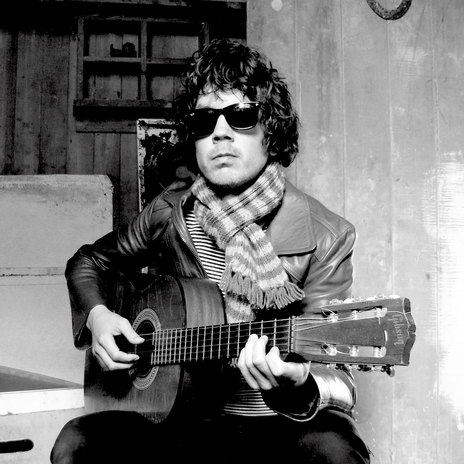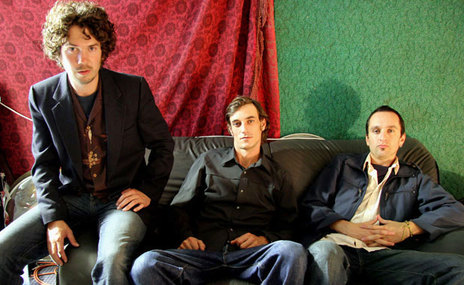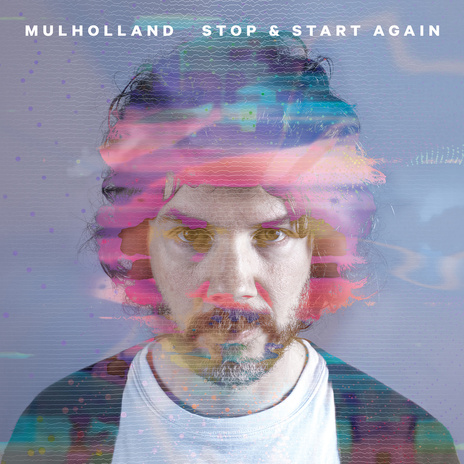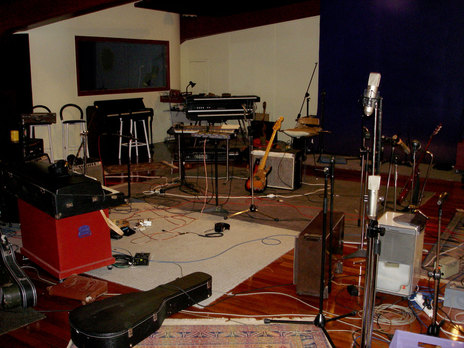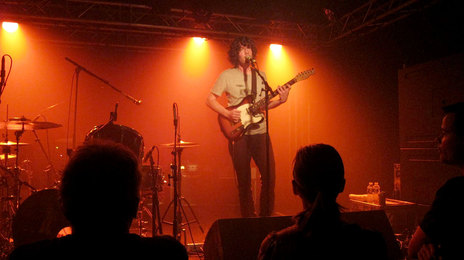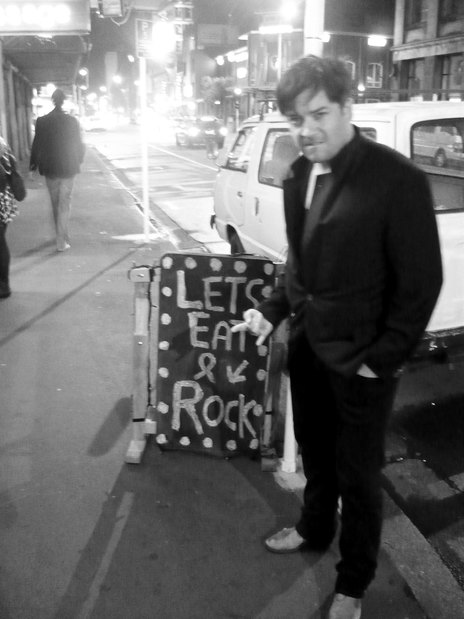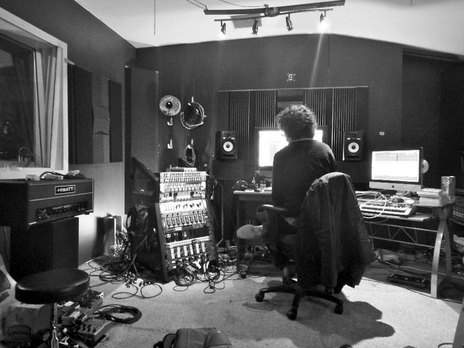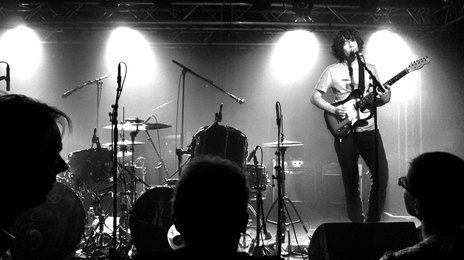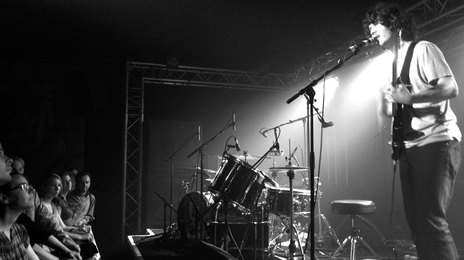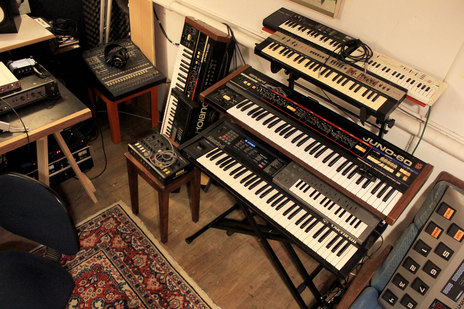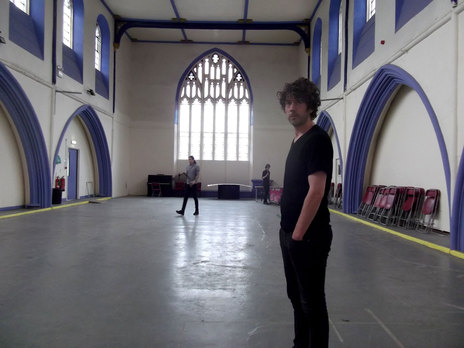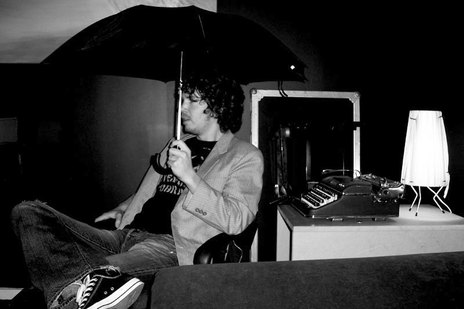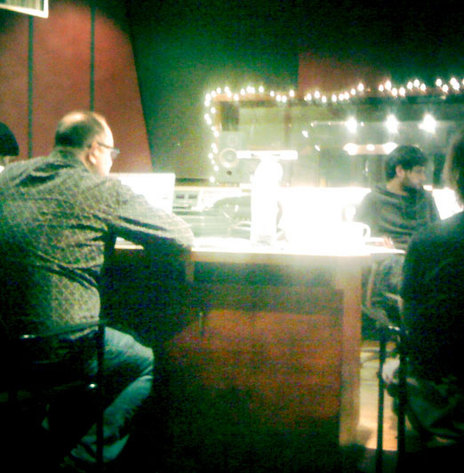Jol Mulholland’s life is surrounded by music, and some of his earliest recollections are vivid. “My first memories are of the acoustic guitar in the lounge … this old Gibson acoustic that Dad had. He was always playing … he played with bands all his life. And, Mum played the piano and wrote songs.” These influences meant it was inevitable that music would feature prominently in his life. As as he says, it “just seemed like a really natural thing to me.”
He started playing the guitar at age 11 to emulate his father, initially playing it upside down (he is left-handed), before switching to playing right-handed. Mulholland senior’s influence also features heavily in Mulholland’s musical career. “He was a harsh teacher,” Jol states. “It was hardcore, but that’s what you do.”
Mulholland rates his eldest brother Sam as being another inspiration, calling him a “great guitarist”. Along with playing instruments, his family also wrote music from early on. “We copied some stuff off records,” Mulholland explains, adding “but mostly wrote from early on. That was the cool thing to do in our family, to come up with your own cool thing.”
By high school, Jol’s attachment to his guitar meant he was cycling to Shirley Boys High with it under his arm.
The Mulholland family relocated from Timaru to Christchurch in the early 1980s. By high school, Jol’s attachment to his guitar meant he was cycling to Shirley Boys High with it under his arm, something that enabled him to feel accepted in the school environment. “I think fourth form is tough for everyone,” he laughs, adding, “I switched schools to an all boys school, a sporty kind of jock school, and I kind of lost my way. I was just playing guitar any chance I could. I started taking it to school, and started hanging out in the art room with the cool guys, and got noticed … and it was awesome. So that was part of the decision to carry on doing music, cause it’s a thing that makes other people feel good. It made me feel good too.”
Mulholland’s experiences with music lessons ended as quickly as they started, finding it easier to pick music up on his own, and considering himself lucky to do so. “I haven’t got perfect pitch, but I’ve always for some reason been real fast at learning, and at picking up different instruments. Being able to get sound out of them … particularly with guitar,” he explains. Mulholland returned to studying music in the mid 1990s, when he attended music departments at Otago University, Nelson School of Jazz, and Canterbury University.
By high school, the decision to be a musician was creeping up. Musical opportunities arose, and he joined his first band, which led to him getting a name for himself.
“I joined my first band at school in fifth form … Paraphernalia,” Mulholland remembers. “So shit! That was with some dudes from school … we entered Rock Quest … [we] didn’t have a drum kit, so our drummer broke into school and stole the school drum kit. We were all pretty naughty!”
Paraphernalia rehearsed in their own room in the old performing arts theatre in Christchurch, and had a specialised set list, as “the singer would only play covers, he would only do The Doors,” Mulholland laughs. “That led me to sort of getting known as a guitarist around Christchurch.” For the record, they came around 15th in Rockquest that year, with a Dire Straits cover.
Moving on from Paraphernalia and covers, Jol joined Fuce, and started writing songs of his own. A side-project to Fuce began in the late 1990s with Mulholland (guitar and vocals), Greg Hillier (bass and keys), and Scott Mason (vocals and drums), which quickly became Gasoline Cowboy. The trio were respected and admired for both their live act and the quality of their recorded output, especially ‘I Hear You Call My Name’, and ‘Philosophies’ – both featuring on Arch Hill’s The Hill is Alive compilation. They aroused media interest, with New Zealand Herald’s Russell Baillie calling the band the ones who “impress the most.” Both songs were played on b-Net and commercial stations. A five-track EP was released, and a debut album promised, though that never eventuated. Another single from the band, ‘Beach on Cali High’ made it to the first Outrageous Fortune soundtrack.
In 2003, Gasoline Cowboy moved to Auckland, hoping to move to the next level.
In 2003, Gasoline Cowboy moved to Auckland, hoping to move to the next level. The band were tight, and Mulholland says there was a lot of trust between them and their manager.
By now Mulholland was unearthing other outlets for his talents, and joined Chris Knox’s The Nothing on bass (with Knox, and Pumice’s Stefan Neville), recording 2006’s Chris Knox And The Nothing album. The Nothing recorded again for the 2010 tribute album Stroke: Songs for Chris Knox.
2006 was significant in Mulholland’s career for another reason – The Reduction Agents. The band (Mulholland, Ben Eldridge, and James Milne) came together by chance one day. “That was such a glorious day, the day I ran into James Milne in Ponsonby, driving down the road,” he remembers, grinning from ear to ear. “He said ‘Gidday Mot, do you want to play bass in the Reduction Agents? And I said yes. The Reduction Agents, it was so cool … literally right place, right time.” An album was released, and they toured as part of the A Low Hum shows, but the trio went on to other projects. However, Mulholland is keen to revisit the band in the future.
Alongside Mulholland’s career as a musician and songwriter is his role as sound engineer. He reckons he’s had the engineering bug since childhood, learning through overdubbing onto tapes on a boombox. “I used to record on one … play it back, and jam over it. Do that while recording on another tape. And then do it again, swap the tapes over.” His break with engineering came when he became the live sound guy for the Steffan van Soest Hit Machine, doing their live sound at Christchurch venue The Dux de Lux.
After moving north in 2003, Mulholland met Olly Harmer from The Lab, and started working there as, “The dude doing the dishes and vacuuming the floors, and sitting in on lots of sessions … it was a really natural progression … it just ended up being a really good place to hang out and end up working.” Mulholland still works at The Lab in his own studio (The Oven), working alongside engineers and producers including Harmer, Jeremy Toy, Tom Healy, Ed Castelow, and Alistair Deverick.
By 2006, future success for Gasoline Cowboy was not to be. Their album was never released (Mulholland hopes to release it in the future), and the band broke up as Mulholland started to write solo material, which “pretty much became my focus,” he says matter-of-factly, adding, “It pissed off a few people, but I had gone through some pretty tough and trying times and The Mots was my way forward.”
Mulholland had written and recorded the album at his mother’s place when he thought about adding his brother Will on drums. This developed to include younger brother Eden, and friend and fellow Cowboy Greg Hillier (Eden and Will Mulholland also formed Motocade).
They considered calling the band Mulholland Drive, or The Mulholland Brothers, instead deciding on the name The Mots. Mulholland explains ‘Mot’ as, “a term I coined for 'mate'. I think it was after a Gasoline Cowboy show in Palmy … some young dudes said 'you right mate', but it sounded like 'you rot mot' – I liked it, and used it colloquially for a while as a positive greeting amongst friends, ‘Hello Mot’ – ‘Rot Mot’ and so on ... and then it just seemed right to call my band, with my brothers and Greg, The Mots.”
The album developed and morphed into The Mots’ self-titled release.
The album developed and morphed into The Mots’ self-titled release. They toured and supported it in 2009, before moving to other projects. For Jol, this included producing, engineering and playing (live) bass with BARB – the supergroup of Liam Finn, Connan Mockasin, E J Barnes, and James Milne, which released a self-titled album in 2010.
Mulholland also worked that year in a dual role as multi-instrumentalist and producer on Kirsten Morrell’s (Goldenhorse) solo album Ultraviolet, and mastered Connan Mockasin’s Please Turn me Into the Snat. Mulholland obviously misses The Mots, and sees the band as something he would love to return to, enthusing “I love [them]. There’s something about … the three of us together. I’ve never had it the same as singing with Will and Eden.”
While he says The Mots happened “for ages”, his next project was gestating – a true solo album under the name Mulholland. Explaining his creative process, he says, “Every so often an album comes knocking. And I just record it, and capture it … It was a huge decision at the time to sort of abandon the name of The Mots … because I’d done the majority of the playing on it. It was a solo album. It was a tough time, but I felt like I had to do it.”
The album, Eugene Told Me You Were Dead gained critical praise – NZ Herald calling it “complex and clever”. The album title came from a conversation between Mulholland’s mother and uncle, where the words “Eugene told me you were dead” were spoken, becoming an oft-told family tale. Musically, the album darts across folky alt-pop melodies, electronic textures, and (often) groove laden rhythms, building to epic soundscapes, with multi-layered harmonies – all recorded and created by Mulholland. However, Eugene Told Me You Were Dead was not widely known – it seemed to have a small distribution channel, and fast became hard to find. Mulholland says he has a number of copies of the album, and hopes to sell some on an upcoming tour, and distribute the others.
After Eugene Told me you Were Dead, a familiar name came calling – Liam Finn. Mulholland met him while in Gasoline Cowboy, back when Finn was in Betchadupa. The two got along well, and Mulholland was impressed with Finn’s knowledge of the music industry, saying, “I thought he was more onto it than us, with the way he operated his band. He knew the ropes.”
Mulholland had also got to know Neil Finn, initially meeting him in 2000 as part of Neil’s Band of Strangers concerts, when Finn toured New Zealand, playing each gig with musicians from the towns and cities he was performing in. Mulholland was selected for the Christchurch gig, and remembers it fondly. “I had a blast, you were meant to do two songs, I ended up playing six songs with them, I was a super, super huge Neil Finn fan.” Neil Finn reciprocates Mulholland’s admiration, telling Hugh Sundae of the NZ Herald in 2010 that Mulholland is an “extraordinary talent.”
Liam Finn asked Mulholland if he wanted tour the US and UK with Finn’s band to support his second solo album.
In 2011 Liam Finn asked Mulholland if he wanted tour the US and UK with Finn’s band to support his second solo album, FOMO. So, what’s a guy to do? The decision to pack up and move to New York was made with Mulholland’s wife, Kate, and within six weeks they were in the USA.
Mulholland not only toured with Finn’s band, he co-wrote a number of songs on Finn’s 2014 album, The Nihilist, sharing credits on ‘Oceans Emmanuelle’, ‘Burn Up The Road’, ‘Wild Animal’, and ‘Helena Bonham Carter’.
New York opened a lot of doors for Mulholland creatively. As a base, he could play his solo gigs to new audiences, and get new responses to his music, describing US audiences as less standoffish. “If they’re at a gig, they are there to see it,” he reasons. “They are quite attentive and into it … [we] played some great shows, and got some really good reactions. I felt the energy there was different from New Zealand – if you’re good, you’ll get heard, if you’re not, you won’t.”
In this land of opportunity, other intriguing developments occurred, including time as bassist with Anglo-American group Pure Love, with whom he toured the UK and US for six months, before playing bass on their album Anthems, recorded with Gil Norton, well-known for working with The Pixies and The Foo Fighters. “That was wicked”, he enthuses. “I think probably one of those mega-deals that you don’t get [often] ... we went to London for a month of pre-production … and then recorded the album in Brooklyn with Gil.”
The decision to return to New Zealand was not taken lightly, and you get the sense that neither Jol nor Kate really wanted to leave New York. When they did return in 2012, Mulholland immediately found himself in demand, working with Anika Moa, Boh Runga and Hollie Smith on their album AnikaBohHollie, playing keyboards and guitar, producing the album, and being their touring guitarist. It was here that he connected especially with Anika Moa, and they began collaborating on her next album, something Mulholland is very enthusiastic about.
“It is awesome working with Anika,” he says. “We’ve made this album, we’ve got about 25 songs that we’ve written together, it’s cool … a weird album, completely different from anything she or I have ever done.” The album sessions occurred over eight-to-nine months, and the pair are in the final stages of completing it. “I hadn’t done a lot of collaboration … it’s just ended up being really sympathetic… you don’t really have to work stuff out – it just comes naturally.”
At first, Mulholland was a little intimidated by the pressure of writing with her, especially as they were starting from scratch. “Initially I knew that was going to happen, so I jammed some stuff up on some keyboards,” he says. “Nothing that I made up worked on the day … it took a couple of weeks to break through that sort of uncomfortable feeling of being intimidated by having to deliver; you’ve got four hours to come up with a song.” This way of writing influenced Mulholland’s work on his other major project – his second album.
Mulholland’s second album, Stop And Start Again is different again from Eugene Told Me You Were Dead. “I feel like Eugene… was, in a weird way, all over the show,” he says. “There were some different styles going on with that record, and it was quite electronic – that’s what I was into at the time. Quite a dense album, whereas this one, the ones I like are really stripped back.”
Stop and Start Again was recorded at The Lab, and mixed on older, analogue equipment.
First single ‘Cry If You Want To’ was released in June 2014, and is a catchy, rhythmic number with Mulholland’s trademark multi-layered harmonies. Stop and Start Again was recorded at The Lab, and mixed on older, analogue equipment. The album was mostly finished and in the mixing stage (mixed by Olly Harmer) when Mulholland wrote lyrics to the final two tracks with a looming deadline.
“I was forcing myself to finish this thing in the middle of mixing … furiously recording everything I could under pressure, which was good,” he laughs. Mulholland doesn’t tie the album down to a particular style, calling it warmer than Eugene Told Me You Were Dead. Stop and Start Again is melodious and textural, scattered with rhythmic inventiveness, while having more frequent quiet moments than his first album. He hopes to tour the album throughout New Zealand and perhaps take it overseas, maybe back to New York.
Since returning, Mulholland is trying to not be too prolific, saying, “I got back here, and just decided to try and limit my involvement in playing with other bands. I love it, but I’ve purposely tried to limit that.”
However, he has been busy: apart from solo albums and collaborating with Anika Moa, he is working on new projects including Bernie Griffin’s latest album Salvation, and Matthias Jordan’s debut EP The Sound Of Asia.
Jol Mulholland may not be a household name yet, but his aim is pure: to play his own music on his own terms and, “Just to get my music out there. I definitely want to, I’d be crazy not to!”
--
Update:
Jolyon Mulholland was also the musical director for the Come Together super-group, which included at various times musicians such as Liam Finn, Julia Deans, Jon Toogood, and Laughton Kora. They toured the country playing cover sets of iconic albums – starting in 2019 with Neil Young’s Live Rust. In 2020 they performed Dire Straits’ Brothers In Arms and the Beatles’ Abbey Road, then in 2021-22 Elton John’s Yellow Brick Road, The Rolling Stones’ Sticky Fingers, and Fleetwood Mac’s Rumours. The shows were incredibly successful and packed out venues such as the Civic in Auckland and the Opera House in Wellington. David Bowie’s Ziggy Stardust was next and followed on from concerts of Bowie’s work by the Auckland Philharmonia Orchestra and Christchurch Symphony Orchestras in 2017, which Mulholland had taken part in.
He also worked as an engineer/producer on albums by Delaney Davidson/ Barry Saunders, Tami Neilson, Elroy Finn, Te Kaahu, and Troy Kingi (he both engineered and co-produced Kingi’s Black Sea Golden Ladder). Meanwhile, Mulholland’s solo work continued and he switched to releasing it under his first name, ‘Jol’. The single ‘Asleep in the Nowhere’ arrived in 2017 and ‘Theorize’ in 2021.
– Update by Gareth Shute
